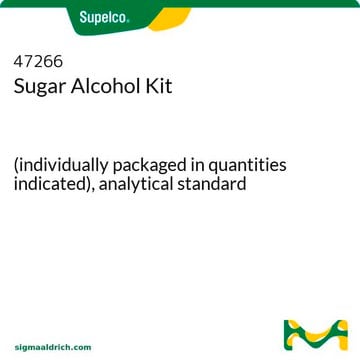Y0000177
Erythritol
European Pharmacopoeia (EP) Reference Standard
Synonym(s):
meso-Erythritol, 1,2,3,4-Butanetetrol, meso-1,2,3,4-Tetrahydroxybutane, i-Erythritol
About This Item
Recommended Products
grade
pharmaceutical primary standard
API family
erythritol
manufacturer/tradename
EDQM
bp
329-331 °C (lit.)
mp
118-120 °C (lit.)
application(s)
cleaning products
cosmetics
food and beverages
personal care
pharmaceutical (small molecule)
format
neat
storage temp.
2-8°C
SMILES string
OC[C@@H](O)[C@@H](O)CO
InChI
1S/C4H10O4/c5-1-3(7)4(8)2-6/h3-8H,1-2H2/t3-,4+
InChI key
UNXHWFMMPAWVPI-ZXZARUISSA-N
Looking for similar products? Visit Product Comparison Guide
General description
Application
Biochem/physiol Actions
Packaging
Other Notes
related product
Storage Class Code
11 - Combustible Solids
WGK
WGK 1
Flash Point(F)
Not applicable
Flash Point(C)
Not applicable
Regulatory Listings
Regulatory Listings are mainly provided for chemical products. Only limited information can be provided here for non-chemical products. No entry means none of the components are listed. It is the user’s obligation to ensure the safe and legal use of the product.
JAN Code
Y0000177-1EA:
Y0000177:
Choose from one of the most recent versions:
Certificates of Analysis (COA)
Sorry, we don't have COAs for this product available online at this time.
If you need assistance, please contact Customer Support.
Already Own This Product?
Find documentation for the products that you have recently purchased in the Document Library.
Customers Also Viewed
Our team of scientists has experience in all areas of research including Life Science, Material Science, Chemical Synthesis, Chromatography, Analytical and many others.
Contact Technical Service









